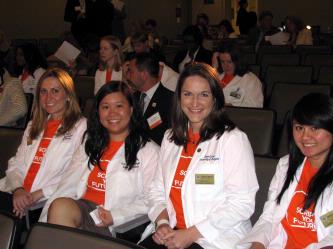School of Pharmacy Participates in National Medication Adherence Campaign
Program focuses on helping patients understand their medications and to reduce poor health outcomes and adverse events.

By Ed Fishel
May 12, 2011
Cherokee Layson-Wolf, PharmD, an assistant professor of pharmacy practice and science at the University of Maryland School of Pharmacy, joined U.S. Surgeon General Regina Benjamin, MD, MBA, and other consumer and health experts May 11 to kick off a national campaign to encourage medication adherence.
The “Script Your Future” campaign by the National Consumers League was launched at George Washington University Hospital in Washington, D.C., and is an effort to raise awareness about the importance of taking medicine as directed.
Sally Greenberg, executive director of the National Consumers League, said failure to take medications as prescribed “leads to increased illness, more hospital stays, and even death … and leads to many avoidable health care costs.”
Benjamin said, “Seventy-five percent of Americans don’t take their medications as directed and that can cause serious consequences. Prevention is the foundation of our public health system … and our national challenge is to prevent poor health outcomes and to become a healthier and fit nation. Approximately 125,000 deaths occur every year because they are linked to patients who did not take their medication as directed.”
A patient care program coordinator at the School, Layson-Wolf reported, “Cost estimates of failure to follow prescriptions range from $100 billion to $300 billion including additional costs for medicines, emergency room visits, hospital admissions, and additional health care providers.”
She said it is estimated that for every dollar spent on drug adherence, $7 could be saved for patients with diabetes, $5.10 for patients with high cholesterol, and $3.98 for people with high blood pressure.
William Shrank, MD, MSHS, assistant professor of medicine at Harvard Medical School, conducted a study on drug adherence and found, he said, “The most effective communicator in the studies that have been published to date was the pharmacist, the retail pharmacist at the point of the pharmacy. Nurses at the point of hospital discharge are relatively effective. Retail pharmacists in the physician’s clinic were less effective. Physicians were the least effective.”
Shrank said, “Retail pharmacists are uniquely positioned in that they have real expertise about the specific good that is being purchased at that moment, there is less complexity about all of the other information that is being thrown around, they are a trusted source of information, and there is time.”
He concluded, “There is really an opportunity for pharmacists to play a bigger and more substantial role or central role in encouraging patients to adhere to their medicines.”
The National Consumers League is partnering with every sector of the health care system, including health care professionals, patient communities, family caregivers, pharmacies, health insurance providers, pharmaceutical companies and associations, as well as government agencies and researchers. The “Script Your Future” campaign also includes coordinated national communications, paid advertising and targeted outreach in numerous cities around the nation including Baltimore, MD; Birmingham, AL; Raleigh, NC; Cincinnati, OH; Sacramento, CA; and Providence, RI.
